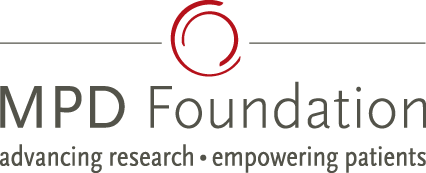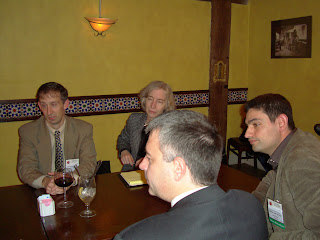Special guest post by PV patient Donna B.
The polycythemia vera part of my story began in August 2006, when I was diagnosed. I went to the hospital with abdominal pain and an enlarged spleen, and several tests (and weeks) later I started phlebotomy treatments. I was 29 years old. That’s not the whole story.
In January 2002, I was diagnosed with a portal vein thrombosis – or as I tell most people “a blood clot in my liver.” That diagnosis came after several weeks of abdominal pain and several wrong diagnoses ranging from gastritis to a pulled muscle. Back then, the clot was attributed to Factor V Leiden, a genetic clotting disorder that, while still uncommon, is more common that PV. The Factor V Leiden diagnosis effectively masked the fact that I also had PV until 2006, when I tested positive for JAK2.
Really, the story begins as early as summer 2000, when I began experiencing chronic headaches and fatigue. Checked against the headache symptoms I dug up online, I found that my headaches combined features of tension headaches (pressure on the back and sides of my head), migraines (visual aura) and cluster headaches (stabbing pain over one eye). I figured that all of these symptoms must be stress-induced, and kept them in check with over-the-counter pain relievers.
I’ve been on Coumadin since that clot was discovered in 2002, and while it was enough to keep my alive, it clearly wasn’t enough to keep me healthy. I spent a lot of time in the hospital between 2003 and 2005, and have the scars to prove it.
Phelobotomy ended up not being enough to keep me healthy, either. Week after week, pint after pint of my “extra thick and chunky style” blood was drained, and yet my spleen was still causing me pain. As long as I sat perfectly still I was reasonably comfortable. A slow shuffle was bearable for short distances. The acts of sitting down and standing up were agony. It was like being kicked in the stomach and kidney at the same time. Lying down to sleep was not an option.
So, I began taking Hydroxyurea. My doctor had some reservations about me taking it, because I am young for a PV patient, and long-term risks of taking the drug haven’t been completely ruled out. I took it for a year with no side effects. The pain in my spleen finally resolved, and my phlebotomy treatments were reduced to every couple of months.
Weekly Pegasys injections had been mentioned to me as a treatment back in 2006. Because it was seen as very promising and doesn’t carry the long-term risks, I wanted to try it right away. Unfortunately, my insurance wouldn’t pay for it. It would, however, pay for thrice-weekly Interferon injections, which I began in October 2007.
Headaches. Fevers. Achy joints. It was like I had the flu three nights a week. I sometimes felt very tired the next day. My hair thinned. I never got depressed, but I think the darker, more introspective side of my personality became more dominant. My tastes changed, too: I stopped putting sugar in my coffee and switched from eating cereal for breakfast to eating yogurt.
Why did I stay on it? I didn’t mind the changes that much. What mattered was how I felt overall, and overall I felt pretty good. I adjusted to the symptoms, taking the shot just before bed and chasing it with a couple of Tylenol. I started playing softball with some friends and found that when I was outside on the field I felt better than I had in years.
I took Interferon for two years. The symptoms eased up after the first year. Now, I only felt flu-ish one night a week. I got used to jabbing myself with a needle. Then, last December, I stopped. There had been a recall of the form of Interferon that I was taking, and I had to switch to a different form. For whatever reason, my blood counts dropped. My doctor thought I’d be better off without the Interferon for a few weeks. When I went in for my next blood test, my counts had all risen again. It seemed clear that they would keep rising if left unchecked. Coincidentally, a new study had just been released that extolled the benefits of Pegasys for PV patients. I walked out of the clinic that day with a one-month supply.
I’ve been on it since then. If there are side effects, I don’t notice them. I no longer shed more hair than my dog. I can take my weekly shot and leave the house without feeling sick. The most inconvenient aspect is that I have to visit the doctor every couple of weeks for a blood test. Pegasys has been very effective for me, as well. I started on 90 miu a week, and now I’m down to 45 miu every other week. Even at this level, my counts are at the low end of normal. I think that, if I had never had PV then this is where my blood counts would naturally gravitate, but there’s no way to know for sure.
I feel really good. I play softball and go rollerblading and hiking. I still eat yogurt for breakfast and never put sugar in my coffee. I know that the test results are important, but the way I feel matters more to me than the numbers, especially since it was the way I felt that told me I was sick in the first place.
This is the first of many personal stories from patients. Feel free to share your story in the comments section or contact me at mwoehrle@mpdfoundation.org to tell your own MPD story on this blog.




